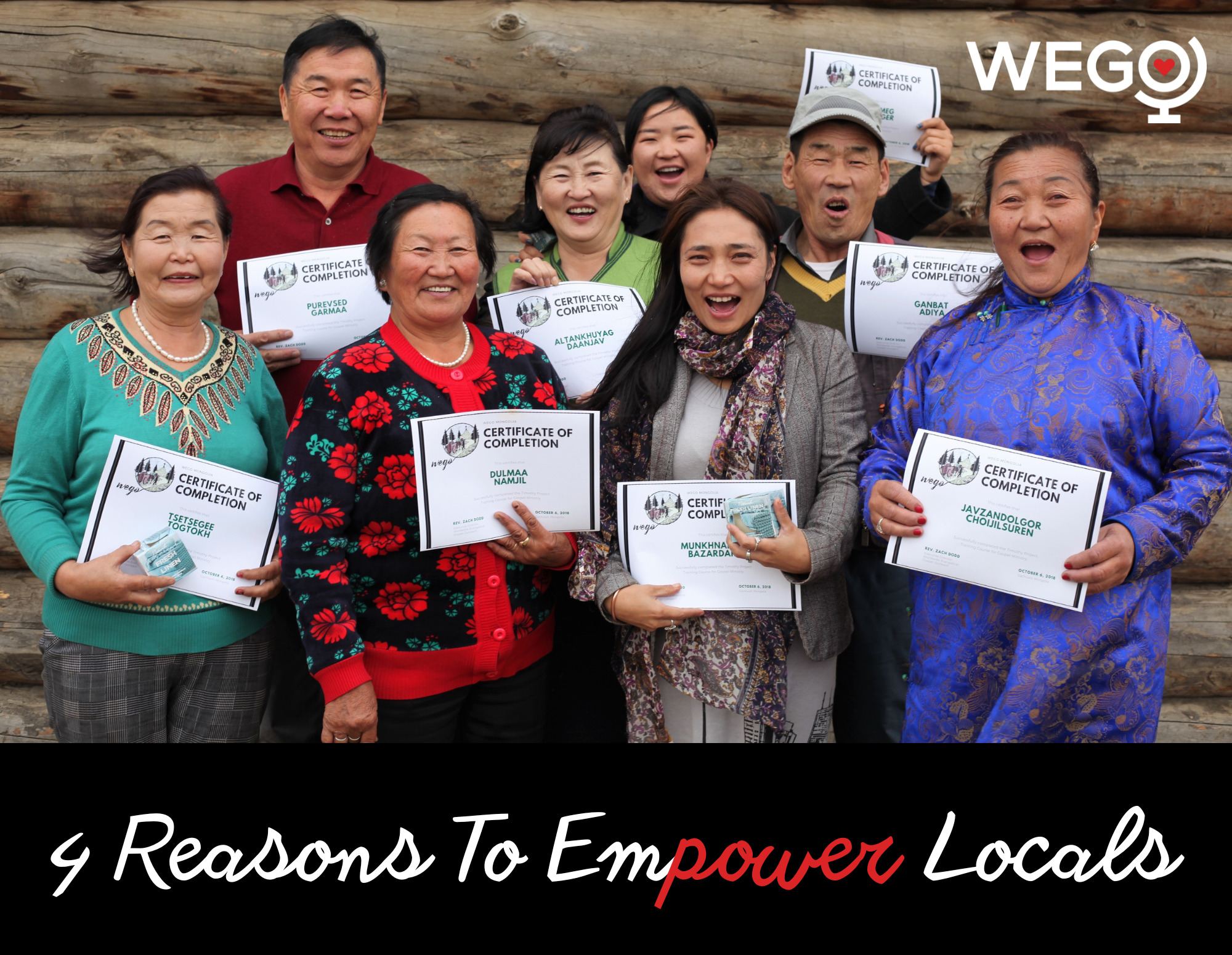By Zach Dodd, WEGO Director
I’ll never forget the moment.
I was preparing my family to move to Mongolia to serve WEGO as missionaries while the organization was actively trying to find a director. I wasn’t interested in the job. I wanted to be in the trenches overseas, not behind some desk in the States. Then God tapped me on the shoulder and I felt a tug to serve WEGO as director. I wasn’t happy though. I was actually a little angry.
“I do not want to move to Florida! I want to serve orphans and reach the unreached in Mongolia.” Then the moment arrived. God’s tender voice in my ear came as a megaphone at full volume. “Yeah, you do it. But you don’t do it. You help them do it.”
Maybe that sounds like some confusing riddle to you but I knew exactly what it meant. My new job description was written in that moment. I wasn’t going to serve orphans and the unreached in Mongolia, I was going to support and equip Mongolians to do it. So, as I write this over eight years later, that’s what we’ve been up to. In fact, I’m currently the only American on WEGO’s staff. WEGO is not just my work or the work of our incredibly dedicated donors and prayer warriors. It is the work of twenty-one Nicaraguans, six Mongolians, and one Ukrainian. They are the ones serving Jesus in the trenches, in their own backyards, just like we’re called to do, too.
This makes our ministry pretty unique. The intent here is not to disparage the strategies of other ministries but to clarify ours. WEGO is a foreign missions organization yet our focus is not on sending missionaries overseas. We focus on empowering and equipping equally-called and gifted locals who are already there.
Local-led ministry has always been WEGO’s strategy and call, long before I arrived on the scene. Our staff have never been hired-hands doing our work. They are local missionaries called by God to do His. Here are just a few reasons we love this approach:
Reason #1: It fulfills The Great Commission
By definition, helping someone mature in Christ and equipping them for service in the gospel is discipleship. When we train and support a Nicaraguan teacher to make disciples among the students in our school, we don’t just make disciples of our students. We just made the teacher one, too. How cool is that?! Our staff are not just means to an end. Their growth in Jesus is also an end in and of itself. So, we make disciples of our staff who then make disciples of the children within our ministries. That’s a lot of disciples being made among the nations! Just this last month, God used one of our teachers to lead six students to faith in Jesus! (More on that next week!!!!) To my calculations, that’s seven disciples being made right there.
Reason #2: It’s Cheaper
I want to be careful here so I’d like to start with two caveats. First, this isn’t about saving a buck by outsourcing the labor overseas. That would be terrible and far away from God’s heart. It’s about stewardship. Like the servants with their talents, it’s about making the best investment we can with what God has provided. How and who we invest in matters. Secondly, I do not want to come across as anti-missionary! Some of my favorite people in the world are foreign missionaries who sacrifice their lives and comfort in obedience to Christ’s high call on their lives. They are worth every penny it takes to send them. And people can’t be originally equipped unless someone is there to do it – whether it’s via a video call, a short-term trip, or a decade-long assignment. But, with these caveats aside, I still believe it’s wise to run the numbers and look honestly at the facts so we can individually choose the best investment to make.
Cost To Support A USA Missionary: $5,000/month
Cost To Support A WEGO Staff Member: $744.76/month
The numbers vary greatly by country and organization but, according to the IMB, it takes an average of $5,000 per month to send a single missionary from the USA to serve overseas. Double if they’re married. This actually seems very reasonable when you consider salary, healthcare, international travel and visas, furlough, language learning, retirement, and everything else needed.
But do you know how much it costs WEGO to fund our ministries every month? $744.76 per staff member! That is more than 85% cheaper. So WEGO sends 6.7 local missionaries for the price of one American missionary. And that figure also includes running a school, children’s home, community center, and my American director salary. Locals don’t have to travel internationally, get visas, or go to language school. They are also able to live at the income level as everyone else in their country. Equipping and supporting locals for ministry is just good financial stewardship. It has to be cheaper. They already live there.
Reason #3: It’ll Make More Sense In 100 Years
To make a good decision about anything you need a good filter to run it through. For me, in this work, I keep coming back to this one: “What do I hope for this country in 100 years?”
Do I want Americans to be in charge? Do I want Americans to be funding it all? Do I want our ministries to be fully dependent upon American missionaries and their training? Do I want Americans to still have the lion’s share of all world’s ministry resources and education? No way!
It would be our greatest honor to completely hand over our ministries to fully-equipped local churches and local believers in the countries where we serve. That is what we hope for in one hundred years. This has also always been the vision of WEGO. So, if that is what we want later, isn’t it best to start moving in that direction now? Local empowerment today is the pathway to fully mature and autonomous ministries later. There is no other way.
Reason #4: Where Else Can They Go?
Again, let’s run some quick numbers. The average USA salary is $59,428. The average salary in Nicaragua is $3,894. A flight from Orlando, FL to Mongolia is currently $1,584 while the same flight from Managua, Nicaragua to Mongolia is $4,405. So, a follower from Jesus in the USA would have to work for 9.7 days to afford the trip. A Nicaraguan believer would have to work 416 days. And this is just the airfare. We’re not even talking about the complications and expenses of obtaining a passport and visa. As you can see, the average American can pretty much afford to make disciples anywhere in the world whenever they want. (Which is amazing.) However, for a majority of people in the world, this would be much, much more challenging. For this group of believers in developing countries, their situation typically confines them to serving Jesus in their hometown and in their home country.
I’m not sure how to say this passively. I’ll just be blunt. Don’t take their limited opportunites to serve away from them. Placing a Jesus-loving missionary teacher from the USA in our school in Nicaragua would take away a place for a Jesus-loving Nicaraguan teacher to serve. That’s why we don’t have American teachers. So, whether you are donating money, going on a week-long mission trip, or serving overseas indefintely, may your sacrifice and presence empower and equip those around you. Create more opportunites to serve Jesus than you take. Give the power to the people. Chances are pretty good, you could leave and go serve somewhere else. But where else can they go?
But none of this is new. This is what Jesus did. He knew His time on Earth would be temporary so He made sure to be more than a solo act. He invited others along and equipped them to minister, too. And you’ll never guess what happened? They carried on long after He left. They still are. You are a part of the multitude reaping the fruit of Christ’s investment and empowerment of others. Whether you are a salesman donating in the States or a foreign missionary in the trenches overseas, the call and commission is the same. We are to keep it going by making disciples of all nations who then make disciples of all nations until His return. Give it some local flavor, while you’re at it, and empower locals for this great work. It’ll take less cents and make more sense down the road. You might even make a disciple along the way.


